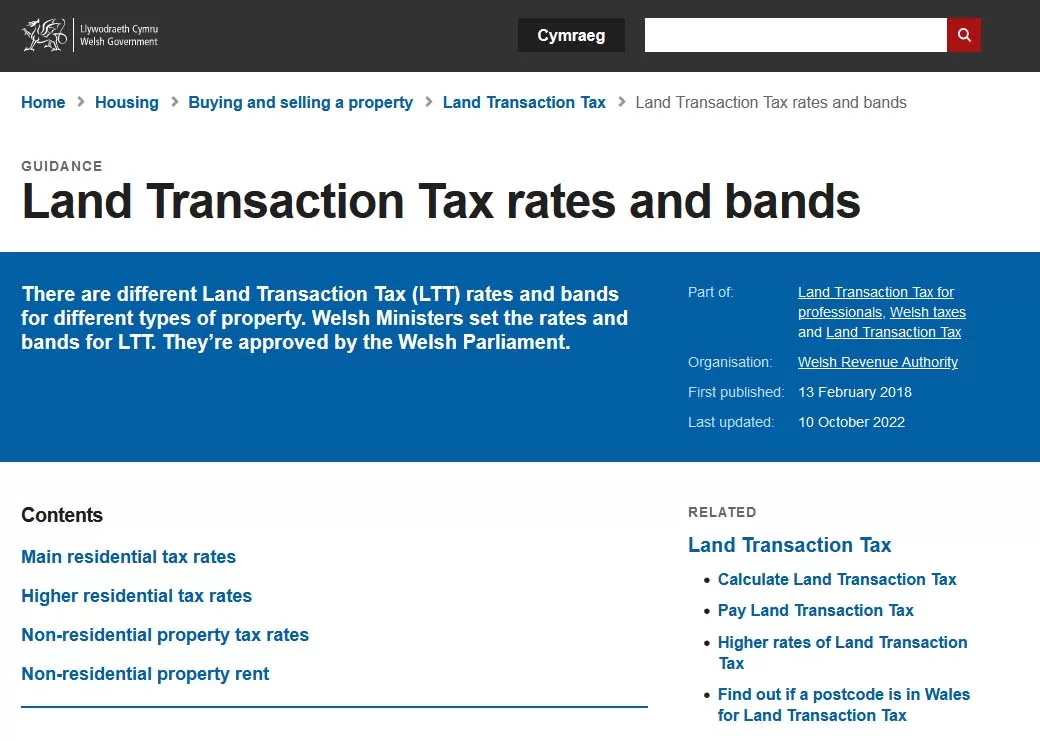Current LTT Thresholds for Residential Properties in Wales (2024)
For a Primary Residence
- Up to £225,000: 0% (no LTT payable)
- £225,001 to £400,000: 6%
- £400,001 to £750,000: 7.5%
- £750,001 to £1,500,000: 10%
- Over £1,500,000: 12%
For a Second Home
For a second property, the additional 4% surcharge applies across all thresholds. Below is the updated table reflecting this surcharge:
- Up to £225,000: 4%
- £225,001 to £400,000: 10%
- £400,001 to £750,000: 11.5%
- £750,001 to £1,500,000: 14%
- Over £1,500,000: 16%
Example Calculation
If you were purchasing a second home worth £300,000:
- The first £225,000 is taxed at 4%: £225,000 × 0.04 = £9,000
- The remaining £75,000 is taxed at 10%: £75,000 × 0.10 = £7,500
Total LTT Payable: £9,000 + £7,500 = £16,500
Important Details About LTT for Second Homes
- Definition of a Second Home: A second home is any additional residential property, such as a holiday home or buy-to-let investment, that is not your primary residence.
- Timeframe for Selling Your First Home: If you’re buying a new main residence but still own your previous one, you’ll initially pay the surcharge. However, you can reclaim it if you sell your old property within 36 months.
- Exemptions: Certain transactions, such as homes bought by charities or for less than £40,000, are exempt from LTT.
- Welsh Government Revenue: LTT is a significant source of revenue for the Welsh government, contributing to local services and infrastructure.
- Buy-to-Let Investments: The surcharge applies to all buy-to-let properties, which has prompted some landlords to reassess their portfolios in recent years.
Interesting Facts About LTT
First of its Kind: Wales was the first UK nation to introduce its own stamp duty system (LTT) after devolution.
Eco-Friendly Initiatives: The Welsh government has hinted at potential future tax relief for environmentally friendly homes.
Regional Differences: LTT is lower than England’s equivalent in some bands, particularly for primary residences, but the surcharge on second homes aligns closely with similar schemes in the UK.
Tips for Buyers
Plan Ahead: Factor in the additional 4% surcharge when budgeting for your second property purchase.
Consult an Expert: Seek advice from your estate agent or solicitor to ensure compliance and explore any potential exemptions or refunds.
Consider Timing: If selling your main residence, coordinate your transactions to minimize surcharge liability.
Understanding Land Transaction Tax for second homes in Wales is crucial for making informed decisions. At Britannia Estate Agents, we pride ourselves on simplifying these complexities for our clients. Whether you’re looking for a holiday home along the stunning Welsh coast or a buy-to-let investment in one of Wales’ vibrant towns, we’re here to guide you every step of the way.
For further assistance, please don’t hesitate to contact us at Britannia Estate Agents. Together, we’ll navigate the path to your next property investment.
